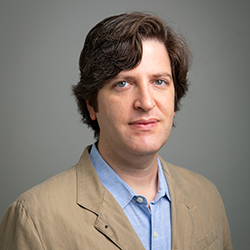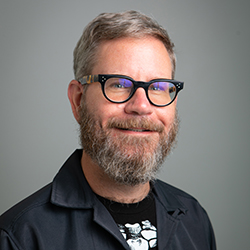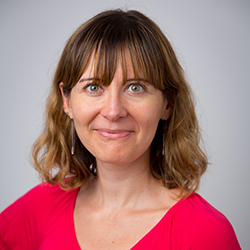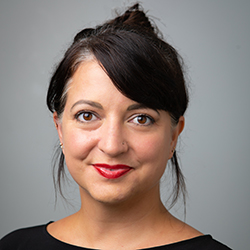2021-2022
 Henry Berlin, Assistant Professor, Romance Languages and Literatures
Henry Berlin, Assistant Professor, Romance Languages and Literatures
Henry Berlin studies medieval literature in Spanish, Portuguese, and Catalan, with a focus on the history and theory of emotion, lyric theory, and, in his most recent work, repetition and improvisation as they relate to gender and the discourse of empire. He is the author of Alone Together: Poetics of the Passions in Late Medieval Iberia (Toronto, 2021) and is currently working on an edition and translation of King Duarte of Portugal’s Leal Conselheiro (Loyal Counselor). His articles have appeared in venues such as La corónica, the Journal of Medieval Iberian Studies, and Hispanic Review, and he is Associate Editor of Catalan Review.
 Laura Chiesa, Associate Professor, Romance Languages and Literatures
Laura Chiesa, Associate Professor, Romance Languages and Literatures
Laura is author of Space as Storyteller: Spatial Jumps in Architecture, Critical Theory, and Literature (2016) as well as articles and chapters on the French and Italian avant-gardes and neo-avant-gardes and on critical theory and the interarts. Her current book project is devoted to literature, cinema, and visual arts from the 1960s to today. The project takes its cue from Michelangelo Antonioni’s film Zabriskie Point and arrives in the end at artist Grazia Toderi’s stereoscopic video art. The project weaves together fictions and subjective visions entangled with broader concerns, from climate change to political and societal urgencies.
 Erin Hatton, Associate Professor, Sociology
Erin Hatton, Associate Professor, Sociology
Erin’s research is centered in the sociology of work, while also extending into the fields of race and gender, culture, labor, law, and social policy. Her publications include the recent book Coerced: Work Under Threat of Punishment (University of California Press, 2020) and The Temp Economy: From Kelly Girls to Permatemps in Postwar America (Temple University Press, 2011). Erin also edited Labor and Punishment: Work In and Out of Prison (UC Press, 2021), an interdisciplinary volume examining the multiple and multi-directional intersections between the carceral state and labor and employment in the U.S. today.
 Matthew Kenyon, Associate Professor, Art
Matthew Kenyon, Associate Professor, Art
Matt Kenyon is a new media sculptor who lives and works in Buffalo, N.Y. He has participated in numerous collaborations with artists, architects, and technologists, including McLain Clutter, Adam Fure, Tiago Rorke and Wafaa Bilal. Matt’s work has been exhibited internationally and collected by institutions including the Museum of Modern Art in New York. Reproductions of SWAMP’s work have been featured in mainstream publications such as Wired and Gizmodo, and also appear in edited volumes such as A Touch of Code (Gestalten Press) and Adversarial Design (MIT Press). Matt was a 2015 TED fellow and a Macdowell fellow.
Stephanie Schmidt, Assistant Professor, Romance Languages and Literatures
Stephanie’s research centers on colonial Latin America and the early modern period, with an emphasis on Nahua studies, the early evangelization of New Spain, and questions of empire. Her recent publications consider doctrinal literature in Nahuatl from the sixteenth and early-seventeenth centuries, early modern Spanish theater, and Nahuatl song-dance. Stephanie is currently completing a book entitled Ancestors and Empire: Foundational Narratives in Anahuac. This book examines a range of writings in Nahuatl and Spanish that critically reflect upon crises of conquest warfare, struggles of religion, and the Spanish colonial occupation of Central Mexico.
 Tanya Shilina-Conte, Assistant Professor, English
Tanya Shilina-Conte, Assistant Professor, English
Tanya’s academic interests include global cinema, transnational, diasporic, and exilic film cultures, film-philosophy, Deleuze Studies, remix studies, and theories of affect and non-representation. Her current research focuses on the philosophical, socio-political, and historical significance of cinematic absence, both as an introduction to the overlooked or suppressed phenomena during different periods of film history and as exposure to alternative means of representation in film and media arts. Her research has been published in Screen, Film-Philosophy, Frames Cinema Journal, Word & Image, Studia Phænomenologica, Iran Namag, Leitura: Teoria & Pratica, Studia Linguistica, Border Visions: Identity and Diaspora in Film, and elsewhere. She is now completing her book manuscript, Black Screens, White Frames: Gilles Deleuze and the Interstices of Cinema, which explores the phenomenon of visual absence from early to post-cinema through the lens of film-philosophy (under contract with Oxford University Press). She has also begun work on a new book project, tentatively entitled Anonymous Cinema in the Global Age.
 Camilo Trumper, Associate Professor, History
Camilo Trumper, Associate Professor, History
Camilo is an Associate Professor of Latin American History at the University at Buffalo (SUNY). His first book, Ephemeral Histories: Public Art, Politics and the Struggle for the Street in Chile(University of California Press, 2016), was awarded the 2018 Latin American Studies Historia Reciente y Memoria Section Best Book Award, the 2017 Latin American Studies Southern Cone Studies Section Best Book Prize, the 2017 North England Council of Latin American Studies Marysa Navarro Best Book Prize, and received an Honorable Mention for the 2017 Southern Historical Association Latin American and Caribbean Section Murdo J. MacLeod Book Prize. His second book project, “Dictatorship’s Children: Education, Repression and Protest among Youth in Chile,” focuses on childhood under Pinochet, paying special attention to the schoolhouse as a site where repression was both felt and fought, and where the youngest Chilenesre-imagined themselves as political citizens.
 Christine Varnado, Associate Professor, Global Gender and Sexuality Studies
Christine Varnado, Associate Professor, Global Gender and Sexuality Studies
Christine studies early modern English literature and queer theory. She is the author of The Shapes of Fancy: Reading for Queer Desire in Early Modern Literature (Minnesota 2020), and essays on “Invisible Sex!: What Looks Like the Act in Early Modern Drama?”, “Getting Used, and Liking It” as an erotic mode, “Queer Nature,” and “The Quality of Whiteness: The Thief of Bagdad and The Merchant of Venice” (Shakespeare Association of America Innovative Article Award, 2021). Her current book project probes the queer and unnatural dimensions of birth and death in Renaissance literature.
Photos by Doug Levere.
